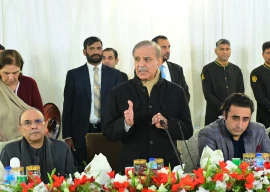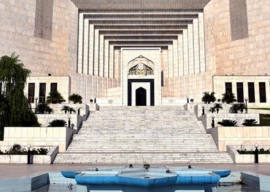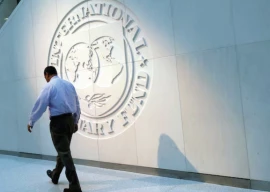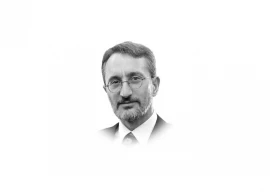
Justice in the time of coronavirus
As CJP took suo motu notice of govt’s handling of pandemic, some argued the matter fell into executive’s domain
ISLAMABAD:
As the novel coronavirus pandemic unfurled, the judiciary found itself at a critical intersection between health and justice.
As efforts to contain the outbreak took precedence, the country’s already high judicial backlog ballooned even further. By November 15, nearly 4,000 more cases were added to the pot of pending judicial business, taking the total backlog to 45,959 cases.
With the second wave showing no sign of subsiding, maintaining full momentum in judicial activity is likely to end up as the judiciary’s biggest challenge going into next year.

When first wave of Covid-19 hit Pakistan, high courts, especially the Islamabad High Court (IHC), passed orders to release under trial prisoners in light of the health challenge. When those orders were challenged by a lawyer in the Supreme Court, a five-judge bench led by Chief Justice of Pakistan Gulzar Ahmed voiced serious reservations. Setting aside the high court orders, the Supreme Court endorsed the suggestion of the attorney general of Pakistan (AGP) to provide relief to only prisoners suspected of minor crimes.
However, the greater significance of that hearing emerged when the CJP took suo motu notice of inadequate government arrangements to tackle the pandemic. The CJP-led bench would go on to hold several hearings on the matter even as a section of lawyers expressed their own reservations. The latter argued that taking steps to contain the outbreak fell into the executive’s domain.
A crucial moment in the case came when the Supreme Court ordered the suspension of lockdown to contain Covid-19 during Eid. The CJP-led bench also questions the Sindh government’s approach to tackling the coronavirus.
Interestingly, unlike the practice adopted by ex-CJP Asif Saeed Khosa during the hearing of public interest litigations and constitutional issues, the larger bench was not comprised of the five most senior judges.
In his first speech in December 2019, CJP Gulzar had announced a revised approach to judicial activism, listing the eradication of corruption and maladministration as his priority. However, despite giving harsh remarks and observations against maladministration and federal government functionaries, he did not pass any coercive order during outgoing year.
The top court even facilitated the federal government in a few matters, for instance by granting permission to hold general elections in Gilgit-Baltistan. It also tempered its stance in several cases when requested to show judicial restraint.
During hearing of a suo motu case regarding losses of billions of rupees in Pakistan Railways, the CJP on January 28 grilled Railways Minister Sheikh Rashid and observed that he should have resigned after the Tezgam tragedy that claimed 74 lives. On the same day, Rashid expressed apprehension over the ongoing judicial activism during a cabinet meeting. At the next hearing, the CJP showed restraint and did not make any harsh observation against Rashid.
During the hearing of a case against the appointment of Air Marshal Arshad Malik as the chief executive officer (CEO) of the Pakistan International Airlines (PIA), the apex court again showed restraint.
The CJP-led bench initially grilled the federal government for violating rules by assigning the position to a serviceman to the position. It also suspended the appointment and asked Malik to abandon one of his two posts. On March 18, however, the AGP convinced the bench to restore Malik as PIA chief, even as government sources revealed the air marshal was unwilling to leave the PAF.
Senior lawyers appreciated CJP Gulzar for his approach of not creating hurdles for executive affairs. They also credited AGP Khalid Javed Khan for providing proper assistance to the bench in all matters, which in turned saved the executive from a tough time.
The CJP’s views on corruption appear to remain the same as his first speech. Some analysts even believe that the top functionaries of both the judiciary and the executive are on the same page and see corruption as the biggest issue of the country. While hearing cases on service matters, the CJP did not spare any official found involved in corrupt practices. The top judge also ordered the establishment of 120 accountability courts and under him, the apex court also expressed displeasure with the National Accountability Bureau for delaying trials.
During the outgoing year, the Supreme Court also gave full attention to Karachi’s circular railway project. Sindh Chief Minister Murad Ali Shah was served a contempt notice for delaying contracts related to the project and the CJP passed a coercive order for the removal of illegal buildings in Karachi.
Regarding cases pertaining to civil liberties, the superior judiciary granted bail to several political leaders in graft cases on different grounds during outgoing year. One section of lawyers, however, believes that civil liberties are not on top the apex court agenda under prevalent circumstances.
Authoring an 87-page landmark judgment in the Saad Rafique bail case, Justice Maqbool Baqar lamented that accountability laws were being used to change political loyalties. The superior bars appreciated his ruling.
Islamabad High Court Chief Justice Athar Minallah was also among the few judges who remained sensitive to issues related to civil liberties. Due to his directives, many journalists and rights activists got relief during outgoing year.
A 10-judge full court on June 19 set aside the presidential reference against Justice Qazi Faez Isa over non-disclosure of his family assets in his wealth statement. However majority judges referred the matter to the FBR for inquiry.
The ruling is most significant in the context of the independence of the judiciary as well as the accountability of judges in future. Following the detailed judgment, two schools of thought have emerged in the Supreme Court. While one side focuses on judges’ accountability, the other minority section wants to secure the judiciary’s independence from non-democratic forces. The latter sees the reference against Justice Isa as an attack on the judiciary. The case is expected to remain a major challenge in 2021.
During the outgoing year, CJP Gulzar, being Chairman of the Judicial Commission of Pakistan (JCP), allowed meetings to review judges appointments to be much more transparent. His approach in this regard drew much appreciation from lawyers as well.
On the health front, outspoken Peshawar High Court Chief Justice Waqar Ahmad Seth lost his battle against a bout of Covid-19. Several other superior court judges were also affected by the pandemic.




















COMMENTS
Comments are moderated and generally will be posted if they are on-topic and not abusive.
For more information, please see our Comments FAQ